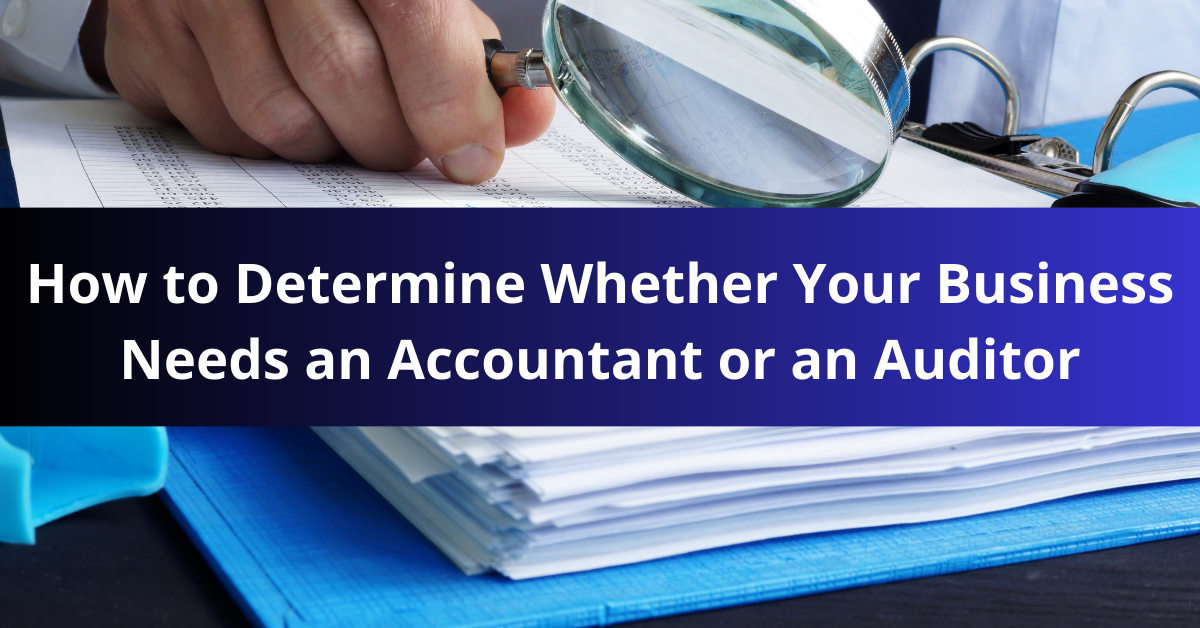How to Determine Whether Your Business Needs an Accountant or an Auditor
Finance plays an important role in the business world. Whether you run a small café or a large company, managing your finances is the key to success. But when it comes to professional help, should you hire an accountant or an auditor?
Understanding the basics: Accountant vs. Auditor
Before diving into the decision-making process, let’s understand the basic difference between an auditor and an auditor.
Accountant: Your financial GPS
Think of an accountant as your financial GPS. They help guide you through the day-to-day finances of your business. Here’s what they do:
- Bookkeeping: Accountants record your income and expenses. They make sure all your financial records are accurate and up to date.
- Tax compliance: Tax season can be a headache so, it would be great to have an accountant by your side. They make sure your business is in compliance with tax laws. They can also help you maximize legally accepted tax reduction strategies.
- Financial Statements: Accountants prepare financial statements such as profit and loss statements, balance sheets, and statements of cash flows. These documents provide a picture of the financial health of your business.
- Financial advice: Need advice on budgeting, forecasting, or budgeting? An accountant can give you valuable insight to help you make informed decisions.
Auditor: The Financial Inspector
Now, let’s talk about auditors. They’re like financial inspectors who ensure that your financial statements are accurate and reliable. Here’s what auditors do:
- Financial Audits: Auditors examine your financial records, transactions, and processes to verify their accuracy. This adds credibility to your financial statements.
- Internal Controls: Your internal systems are examined to prevent fraud and error. This helps strengthen the financial integrity of your business.
- Risk Assessment: Financial auditors identify financial risks and suggest ways to mitigate them, protecting your business from potential problems.
When to hire an accountant
Now that we know what accountants and auditors do, let’s take a look at when it’s best to hire an accountant for your business:
- Daily financial work: If you need help with day-to-day financial tasks like bookkeeping, invoicing, and payroll, an accountant is your go-to professional.
- Tax season: When tax time comes around, having an accountant keeps you in compliance with tax laws to make sure that you file and pay your taxes on time.
- Financial planning: Whether you want to create a budget, set financial goals, or analyze the performance of your business, an accountant provides valuable financial guidance.
Time to bring an auditor on board
Now, let’s explore the circumstances under which hiring an auditor makes sense:
- Financial transparency: If your business is seeking outside investors or creditors, an auditor’s stamp of approval on your financial statements can put you at ease.
- Legal and Business Compliance: Some industries and government agencies like the SEC and BIR require regular audits. If your business falls into any of these categories, an auditor is essential.
- Complex transactions: For businesses involved in complex financial transactions or mergers, the auditor can ensure that everything is on board and in line with industry standards.
- Fraud or suspected irregularities: If you suspect fraud or irregularities in your organization, an auditor can conduct a thorough investigation to uncover any issues.
Making the decision
Now how do you decide between an accountant and an auditor? It usually comes down to the size, needs, and goals of your business.
Small businesses: For a small cafe owner, for example, accountants are often enough. They can handle day-to-day finances, tax compliance, and financial advice. Generally, auditors are reserved for larger projects with more complex budgets.
Medium to large enterprises: As your business grows, consider hiring accountants and auditors, especially if you plan to seek outside funding or face regulatory requirements.
Budget considerations: Accountants are generally much less expensive for routine financial services. Auditors charge high fees because of the depth of their work. So, think carefully about your budget.
Consultation
If you are unsure of which professional to hire, consult with an accountant and an auditor. They can give you an insight into your specific needs and help you make an informed decision.
Finding the Right Balance
Ultimately, choosing whether to hire an accountant or auditor depends on the specific circumstances of your business. Accountants are like financial partners, guiding you through day-to-day finances. Auditors, on the other hand, act as controllers of finances, ensuring transparency and compliance.
Consider the current needs and future aspirations of your business when making this important decision. After all, it’s all about finding the right balance to keep your financial ship sailing smoothly.
If you are in need of high-quality accounting or auditing services, our team at DJKA Business Solutions, Inc. would be happy to assist you.
Allow us to work with you to achieve your financial success – just send us an email at info@djkaaccounting.com for more details.
Related Posts
Recent Posts
- How to Process the Sworn Declaration Required by BIR for Electronic Marketplace Sellers
- Understanding Tax Compliance for e-Marketplace Businesses
- Who Needs to Submit GIS to the SEC?
- Understanding these Financial Ratios for Business Decision-Making Purposes
- What you Should Know about the Ease of Paying Taxes Act





